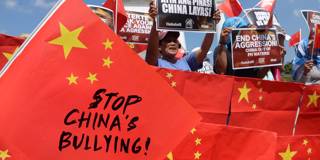US President Donald Trump's administration wants to build a rules-based and democracy-led order in the Indo-Pacific, but seems to have no idea how. If it doesn't find the answer soon, and imbue its Asia policy with strategic heft, constraining Chinese aggression will only become more difficult.
HANOI – With the global geopolitical center of gravity shifting toward Asia, a pluralistic, rules-based Indo-Pacific order is more important than ever, including for America’s own global standing. So it was good news when, two years ago, US President Donald Trump began touting a vision of a “free and open” Indo-Pacific, characterized by unimpeded trade flows, freedom of navigation, and respect for the rule of law, national sovereignty, and existing frontiers. Yet, far from realizing this vision, the United States has allowed Chinese expansionism in Asia to continue virtually unimpeded. This failure could not be more consequential.

HANOI – With the global geopolitical center of gravity shifting toward Asia, a pluralistic, rules-based Indo-Pacific order is more important than ever, including for America’s own global standing. So it was good news when, two years ago, US President Donald Trump began touting a vision of a “free and open” Indo-Pacific, characterized by unimpeded trade flows, freedom of navigation, and respect for the rule of law, national sovereignty, and existing frontiers. Yet, far from realizing this vision, the United States has allowed Chinese expansionism in Asia to continue virtually unimpeded. This failure could not be more consequential.